Bomb Hits Syrian Army Bus In Damascus Killing At Least 14
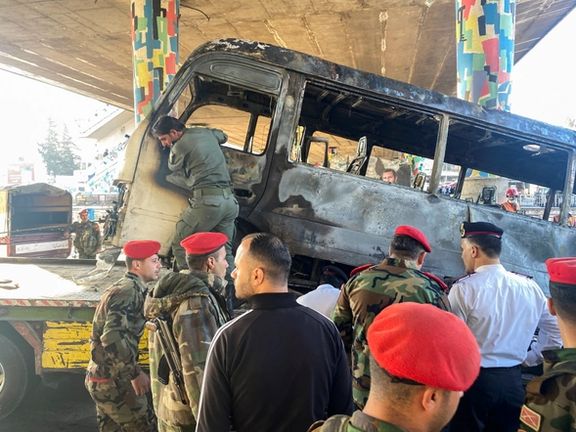
A bomb attack on an army bus in Damascus on Wednesday killed at least 14 people, followed by army shelling in rebel-held Idlib that killed 11 civilians.

A bomb attack on an army bus in Damascus on Wednesday killed at least 14 people, followed by army shelling in rebel-held Idlib that killed 11 civilians.
The attack on the rebel-held town of Ariha, which took place shortly after the Damascus bombing, had caused the biggest civilian death toll in the Idlib area since March 2020, the Syrian Observatory for Human Rights said.
There was no immediate claim of responsibility for the Damascus bombing, which hit a bus carrying army personnel in the middle of the city at around 6:45 a.m. (0345 GMT), state television reported.
A military source quoted by state media said the bus was blown up by two bombs that had been attached to the vehicle in advance. A third device was defused by an army engineering unit.
Attacks in Damascus have been rare since the army crushed rebel enclaves around the city with backing from Russia and Iran-backed forces in 2018.
Islamic State militants still operate in the deserts of central and eastern Syrian desert, where they have mounted several attacks this year on army vehicles.
Northwestern Syria is the last major stronghold of rebels fighting Assad. The witnesses and rescue workers said shelling struck residential areas of the rebel-held town of Ariha shortly after the Damascus bomb attack.
Turkey's state-run Anadolu Agency said government forces and Iran-backed groups targeted a marketplace in the Ariha town center.
Reporting by Reuters
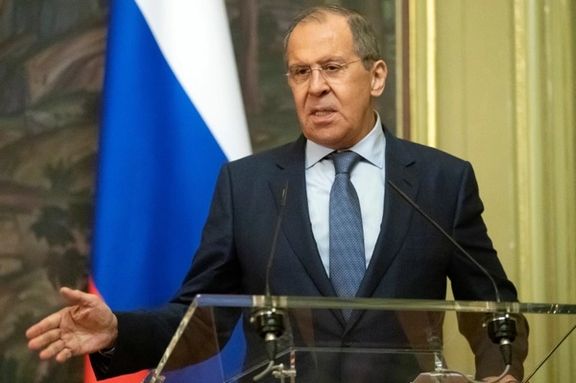
Russia has hosted talks about Afghanistan on Wednesday involving senior representatives of the Taliban, Iran, China, Pakistan and India.
The talks coming amid uncertainty about the impact of the Taliban rule is a round of diplomacy that underlines Moscow's continuing influence in the region.
Opening the meeting, Russian Foreign Minister Sergey Lavrov expressed regret that the United States had chosen not to send a delegation, saying he hoped the US would attend future talks.
He said the Taliban was now in power in Afghanistan and there was no alternative to this for the foreseeable future.
His comments reflected Russian President Vladimir Putin's comments last week that although there should be no rush in officially recognizing the Taliban as the new rulers of the country, it was necessary to engage in talks with them.
Lavrov emphasized the security challenges posed by the Islamic State group and other militants based in northern Afghanistan and noted that drug trafficking from Afghanistan would continue to present a challenge.
Iran has also voiced concern over recent terror attacks targeting the Shiite minority in Afghanistan, attributed to the Islamic State group.
With reporting by AP
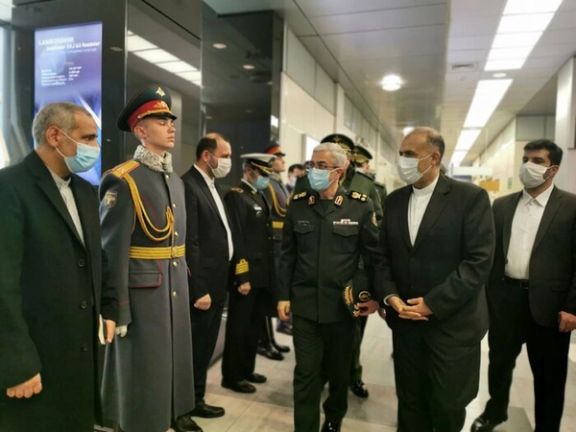
Iran’s military chief of staff who is visiting Moscow has said that Supreme Leader Ali Khamenei attaches “special significance” to expanding ties with Russia.
General Mohammad Bagheri who has been on an official visit to Russia this week told the official government news website, IRNA, that the Russian Iranian military alliance in Syria is an example of extensive cooperation and added, the two countries made a lot of efforts “to protect Syria’s sovereignty”.
Iran entered the Syrian civil conflict as early as 2011, deploying advisors and troops to help the embattled government of Bashar al-Assad. Russia joined the war in 2015 by deploying its air force that together with Iran-organized ground troops largely defeated the rebel forces.
Bagheri went on to say that Russia and Iran have always supported one another on the international arena and “on the military front there is not any kind of misunderstanding and lack of clarity.”
The top Iranian military commander described bilateral relations as “growing and expanding”, insisting that Khamenei and President Ebrahim Raisi (Raeesi) “attach special significance to expansion of relations with Russia.”
Khamenei, who has always spoken against the United States and Western European powers, insists that Iran should pursue an Eastern strategy, developing closer ties with China and Russia.
While he has banned direct talks with the US, and even earlier this year banned American and British Covid vaccines, Khamenei advocates self-reliance and cooperation with non-Western countries and blocks. His beliefs dominate the thinking among his hardline supporters who now control all three branches of the Iranian government.
Bagheri, referring to the United Nations arms embargo on Iran that expired last year, said that Tehran is pursuing arms deals with Moscow and his visit was aimed at discussing agreements. Bagheri added that the joint Russia-Iran military commissions will meet in Tehran in the next three months.
So far, Russia has not publicly committed to supplying new weapons to Iran, but Bagheri said on Monday that agreements have been signed to buy warplanes and helicopters from Russia.
As the fate of nuclear negotiations between world powers and Iran remains unclear, Russia can play a pivotal role in pressuring its ally to be flexible and return to the talks that were suspended in June by Tehran.
Iran, on the other hand, tries to highlight its relations with China and Russia to show the West that it is not so much dependent on an agreement and can save its economy by working with West’s competitors. But except some clandestine oil purchases, China for example has generally respected US sanctions. More than the Chinese government, large companies are wary of going business with Iran, concerned about retaliation by the United States.
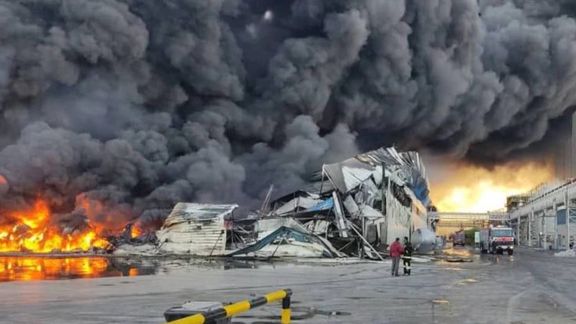
A large blaze with unknown origin broke out in a food processing plant in central Iran early Wednesday that according to local media has destroyed the factory.
The plant processes and packages tea and cooking oil. The fire started at 3:00 am according to the manager of the factory. He described the cause of the blaze as “internal” but gave no further details. According to the local governor, Siamak Soleimani, two people have been injured, but images published show extensive flames raging in the complex.
The packaging section and the warehouse of the plant located in an industrial zone have completely burned down.
Law enforcement personnel and firefighters rushed to the scene trying to battle the fire, but Soleimani told the media that the building was still burning in during rush hour. The police chief in the area was one of the injured persons as he tried to fight the fire.
There have been a series of mysterious fires and explosions in Iran’s nuclear, military and industrial facilities since July 2020.
In one such incident lately, a large blaze broke out in an electrical motors manufacturing factory in Shahre Kord, west-central Iran on September 27.
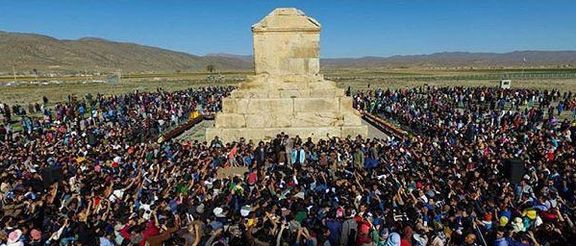
Many ordinary Iranians will mark the Day of Cyrus the Great on October 29, which can turn into a politicized event the Islamic government might try to prevent.
While authorities have been making every effort during the past years to keep the Day of Cyrus the Great a low-key event and to dissuade Iranians from visiting his tomb at Pasargadae, blunders by President Ebrahim Raisi and one of his ministers alerted everyone in Iran that Cyrus Day (October 29) is approaching.
Last week, during a visit to Fars Province in southern Iran, where the 6th century BC Achaemenid monuments Persepolis and the Tomb of Cyrus the Great (circa 600-530 BC) the celebrated Achaemenid king is located, Raisi denounced the Achaemenids as "oppressors" while the ancient dynasty, particularly Cyrus the Great are internationally known as champions of human rights and toleration for religious and ethnic diversity.
Culture and Tourism Minister Ezatollah Zarghami made a bigger and more controversial blunder during his visit to Pasargadae last week. In the countryside, where digging too many wells as well as mismanagement of other water resources, have created massive sinkholes across the Iranian plateau, Zarghami suggested that the government should allow more wells around the historic site.
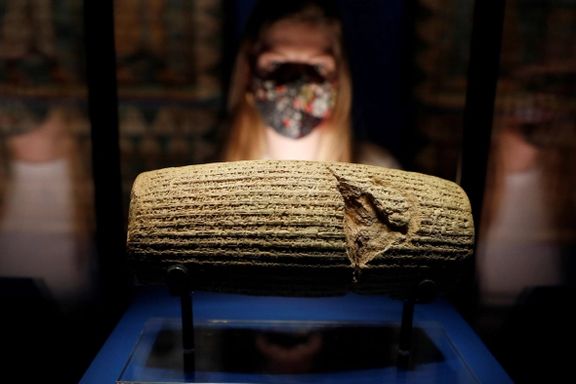
Critics in the press and on social media pointed out that even without new wells, the tomb of Cyrus may disappear in a deep sinkhole any day. Others charged on social media that Zarghami has forgotten that his role is protecting cultural heritage rather than boosting agricultural products.
A commentary on the Asr Iran news website reminded Zarghami that what he suggested was like "planting carrots on a gold mine." Zarghami soon retracted his comment when attacks escalated on social media, but the damage was done.
Social media users such as cultural activist Mohammad Bagher Tabatabai warned Zarghami that "The tomb of Cyrus the Great has a place in the heart of every Iranian. You can never destroy it."
During the past years, particularly after the 1979 Islamic revolution and despite Iranian officials' violent crackdown on pro-monarchy demonstrations, thousands of Iranians visited Pasargadae to pay tribute to the great ancient king. The celebration became a political event in October 2016 when thousands of visitors to the tomb began chanting slogans against the Islamic Republic.
The following year and every year since, the Revolutionary Guards (IRGC) deployed forces to the region and blocked all roads to Pasargadae to prevent the celebrations. But still, thousands of young men and women somehow managed to gather around the monument and sing patriotic hymns.
The commentary in Asr Iran website noted that "Zarghami has never been a tourist or a tour leader and has no experience about protecting cultural heritage. He is a former IRGC officer who has studied urban planning and industrial management. Although he has been deputy culture minister for cinema for a while, yet, surprisingly, someone like him is assigned to protect the country's cultural heritage."
The commentary reminded Zarghami that tourism can produce more financial resources than agriculture. The website suggested that Zarghami should look at Iran's neighbors such as Turkey and see how they make money from tourism. "Turkey's income from tourism is more than Iran's income from oil. Last year Turkey earned $29.5 billion from tourism," claimed the website citing Anatolia news agency.
In 1979, "hanging judge" Sadeq Khalkhali, who killed hundreds after the revolution, had a plan to destroy all monuments including Persepolis as heretic idolatry, but intellectuals and patriotic Iranians prevented the destruction of the sites. Later, most Iranian officials, particularly former President Mahmoud Ahmadinejad realized that they could count on public interest in Iran’s historical heritage to garner support. The blunders by Raisi and Zarghami could signal a return to the ideas of the hanging judge.
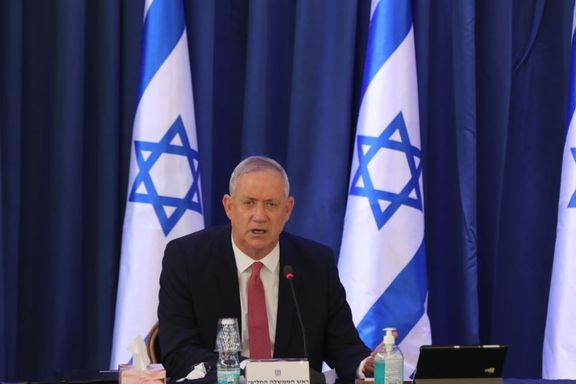
Israeli Defense Minister Benny Gantz has appeared before a key Knesset committee to argue for a higher defense budget, citing Iran as the major threat.
Gantz said the most significant threat Israel faces is Iran and its nuclear program, adding the armed forces need the means to confront the danger.
“We see that Iran is advancing toward the level of enrichment that would allow it, when it wished, to become a threshold state — and we are making every effort to prevent that. We will invest in our offensive and defensive capabilities, improve our technological superiority, and accelerate our efforts to ensure that — even though Iran is foremost a global and regional challenge — Israel will always have the ability to defend its citizens with its own forces,” The Times of Israel quoted him as saying.
Israel’s channel 12 reported Monday that a budget of roughly $1.5 million is being allocated to procure the necessary weapons to confront Iran if it refuses to return to nuclear talks with Western powers.
Gantz also said that a higher budget is needed for a two-front war, a possible reference to a conflict with Palestinian groups in Gaza or with the Lebanese Hezbollah, both backed by Tehran.